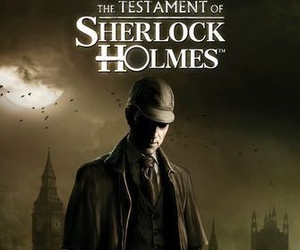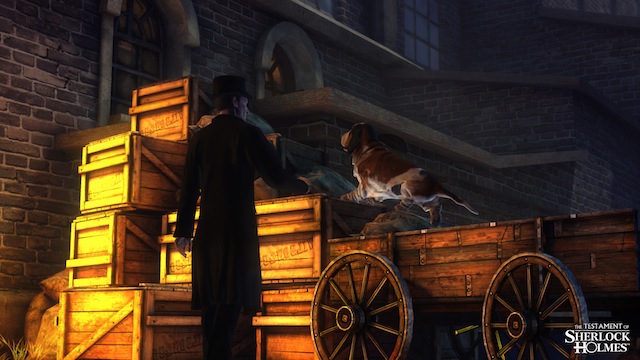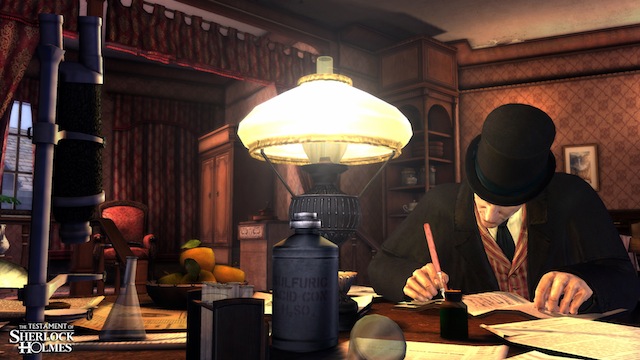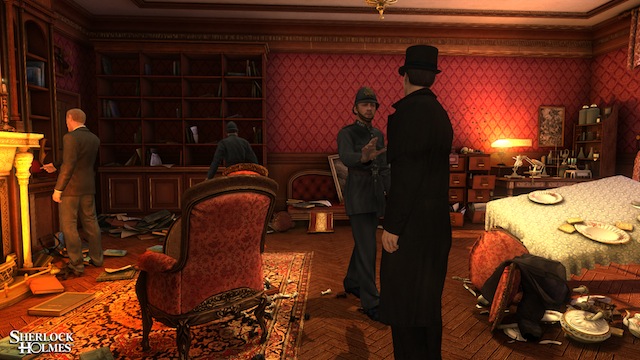The Testament of Sherlock Holmes Review
 Game: The Testament of Sherlock Holmes
Game: The Testament of Sherlock Holmes
Developer: Frogwares
Publisher: Focus Home Intractive
Available on: Xbox 360, PlayStation 3 and Windows PC
Reviewed on: Xbox 360
Over the years, there have been numerous iterations and revisions of Sherlock Holmes in video gaming. Some have been far more successful than others, but Frogwares have held the license for quite some time, and are now somewhat synonymous with the Deer-Stalker wearing Detective and his medical sidekick. PC gamers and DS fans have had the chance to play many games made exclusively for their platform, but whilst there has been one or two ports to home consoles, Frogwares have never developed for them specifically. That is until now, as The Testament of Sherlock Holmes was developed from the ground up for Xbox 360 and PlayStation 3, with controls and gameplay systems designed to make the most of control pad gameplay. How does this transition work however, and will the game find a market on the much faster-paced consoles, with an audience which is used to action.
STORY: Rather strangely, the story begins with a group of small children in the modern day, who are playing games in their loft. They seem to occupy the building that was once home to the sleuthing duo, and discover the diary of Doctor Watson. They read the story, becoming a link that re-appears between each chapter. Not only is this a little disturbing because unfortunately the character models of children throughout the game aren’t very good and all look very creepy, but the idea of five or six year-old children reading about – and enjoying, I might add – a series of grisly murders, is a very weird idea. It is wholly unnecessary and the game would have been served better without any of this exposition at all.

The real story itself concerns the apparent slide off the rails of Sherlock Holmes, as seen by Watson, as he investigates the killing of a prominent Bishop. Holmes begins to use tactics that both Watson and the player question as being shady, and he seems to lack any sense of compassion in the case, simply wanting to find those responsible by any means. This is an engaging development in the tried and tested Holmes story as, for once, we question his motives and even suspect him of criminal acts himself, turning the long-established conventions of the character on their their head. It pushes the player forward, wanting to uncover the truth and to find out what is really behind Sherlock’s strange behaviour.
GRAPHICS: Visually, the game might not impress those who are accustomed to the higher-end blockbusters we see on current-gen consoles, but the three dimensional world, with independently operating NPCs, is a real step forward for the series. Not too long ago, all of Frogwares titles were 3D models on flat backgrounds, but clearly the team wanted to build something that would be comparable with our current expectations. The streets of London are detailed and bring about the feeling of the time period strongly. Costumes are also authentic and make the characters look a lot better, even when the facial detail might not be as high as we have come to expect. Some characters just seem to be stuck in a constant stunned expression. Of course, there are limitations, as draw distances are terribly short (down-played by the implementation of the famous London Pea-Souper fog), lip-sync is way off the mark and animations seem to regularly go awry or get stuck in a loop, the controls don’t help altogether with the graphical issues either. Often players will find themselves getting too close to an object to be able to interact with it, so they become stuck in a walking loop or just have to move away again in order to re-position the camera. However, it must be said that after you get used to these niggles, and to controlling the characters, these issues will be minimised as you will know how to avoid them more often than not.
SOUND: The voice over work is probably the most impressive aspect of the sound design, with a massive cast of both important and background characters. Children suffer in voice acting, just as they do in terms of their looks, and some NPCs re-use lines from one another, but the overall standard of the acting is quite high, with the most attention obviously being given to the dynamic duo. Thankfully, the Cockney accents aren’t too stereotypical and over the top, and the natural delivery of most of the people (aside from Watson, who always seems to be anxious or dramatic about something) only further helps the air of authenticity. Sound effects are fairly basic, but the biggest let down is the uneven musical soundtrack. Sometimes the moody music will successfully help increase the tension or atmosphere in a location, whereas at other times it appears too high-tempo, or even too drawn out, and doesn’t suit the pace of the game. This isn’t an FPS or an action game; puzzling never really reaches fever pitch.

GAMEPLAY: The gameplay has obviously been tweaked a little to accommodate gamepads, but at heart the Sherlock Holmes experience is similar to any modern adventure game. You investigate crime scenes, collect clues and examine evidence in order to come to a conclusion. This is carried out through direct character control, either in first or third person view, depending on your preference, and what hotspots are around the scenes that can be examined, picked up or interacted with, or even people who can be spoken with. One interesting sequence even has you controlling a sniffer dog and following a scent, to help Holmes locate a particular suspect.
An interesting new feature that has been added to this edition is the Deduction Board. This tracks the different clues and leads that you have discovered, and when you have gathered enough you can start to make deductions. These consist of questions, each with three multiple choice answers, which will help you narrow down the truth, by interconnecting and adding up to a final theory. It is rather hard to explain in writing, but the system is a good way of allowing players to come to their own conclusions, rather than the game adding up all the evidence; as happens in many detective titles.
As well as inventory and conversational puzzles, the game is also filled with many logic and traditional puzzles, such as jigsaws, sliding tile puzzles and lock boxes, with intricate code systems. These can be quite complex and take some time to figure out, but none are awfully taxing to the point of frustration. Even if you do get stuck, spend long enough on one of these teasers and you will be given the option to skip the puzzle and move on, so you won’t get stuck in one place.

LONGEVITY: The game isn’t short overall, and just when you think you have solved one part of the case, another lead will spring up. Especially with some of the puzzles becoming a bit tricky, they could keep you busy for a while. Then there are also the Achievements/Trophies , some of which require you to not skip a single puzzle, and some are missable in your first play-through, so you will want to go back and complete them, so this will add a little extra life to the game. However, like so many adventure games, the story and the linearity won’t lend themselves to many repeat plays.
VERDICT: The Testament of Sherlock Holmes takes an interesting premise and weaves an intriguing plot which will keep avid adventurers interested through to completion. However, the somewhat clunky graphics and the baffling decision to book-end proceedings with the idea that children are reading this story are aspects that might put off players who don’t wait to get to the meat of the game. It sets a bad first impression, but the investigation and deduction system is robust and effective, giving players the real feeling that they are working the case themselves. It may be a hard game to sell to those who aren’t used to some of the quirks and eccentricities of the adventure genre which die-hard fans are already used to, but the concessions to console controls and the 3D game-world do a good job of making it more accessible. Despite its shortcomings, the game is a solid addition to the Conan Doyle canon. For those after a good crime yarn, the game is most certainly afoot!







